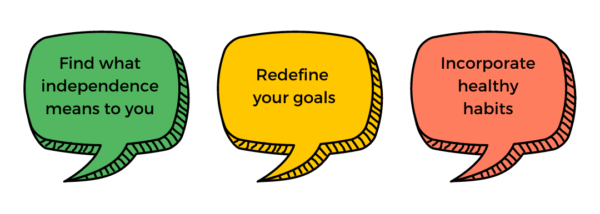
The reality is that breakups are difficult times. Place one within the time of studying for the HSC or high school examinations, and this may seem all too overwhelming.
But, fear not, because breakups are also times of self-growth, reflection, re-evaluation and new spaces for other joys in your life. It might even make the emotional throes in Hamlet that bit more relatable or give you a spark of creativity in your writing!
If you’re trying to get through a breakup, we’ve got your back — we’ve called upon Andrea Efthymiou, a Psychology (Honours) graduate from USyd, to give advice on how to be strong and feel better after the end of a relationship.
Let’s get into it!
The Science Behind Breakups
You Are Not Alone
Proactive Steps on How to Get Over a Breakup
How to Help a Friend Through a Breakup
The Science Behind Breakups and How to Feel Better After a Breakup
No matter whether your relationship was long or short, ended on mutual or unrequited terms, or whether the breakup was your first, second or third should not define the emotional and mental impact of the grieving process. There are absolutely no parameters to what and how you feel.
The love we experience in relationships produces oxytocin and dopamine in our bodies, which are “love hormones” that make us feel happier, even to a euphoric state.
When we go through a breakup, the withdrawal of these hormones will undoubtedly make you feel as if you are missing something. But, just as these hormones can be found in relationships, “happiness” hormones can be produced in other situations and in activities such as:
-
- Exercise (boosts endorphins, dopamine and serotonin!)
- Hanging out with friends
- Listening to music
You Are Not Alone
It follows that all the feelings you feel during a breakup are valid, and grieving is not a linear process; you may feel better and then feel worse again, and that is normal. Tackling heartbreak in high school, especially while going through the HSC, is no small feat so, be kind to yourself and the way you approach your emotions!
People often agonise over the question of how long it takes to get over a breakup. But Andrea tells us that the truth is that “there is no way to predict how long it will take to get over a breakup, and I don’t think there should necessarily be a rush. Whatever pace you take to heal is absolutely valid and sometimes not healing fast enough can make you feel guilty or embarrassed about still not being over it.”
Though there is no silver bullet to feeling better in ‘X’ amount of time, the important part of getting over a breakup is not repressing your emotions. Instead, feel the physicality of all your emotions, validate what you feel and let each emotion naturally pass in its own time.

So, what are some proactive steps on how to get over a breakup?
The post-breakup stage is a period of realisation, recalibration and though it might not feel like it at first, a time of exciting self-growth.
“Overall, I think the most important point to emphasise is that each and every person has value in and within themselves,” Andrea tells us. “To this end, whether or not you are single or taken should not add or detract from your self-worth.”
Importantly, you might realise that the societal narrative around relationships isn’t quite true; we’re told that we have to find our “other half” as if we are not whole on our own! This is entirely false and, in fact, believing this can generate a lot of co-dependence when you are in a relationship.
“In saying that, a breakup is obviously usually a huge personal and emotional loss, as you have lost someone close to you,” Andrea says. She recommends three steps on how to get over a breakup:

#1: Find what independence means to you
You know yourself the best, and if you feel that you don’t, a breakup can offer the space to figure who you are and what makes you feel happy on independent terms. Although studying for the HSC is mainly an independent endeavour, social isolation and neglecting your support network is equally as detrimental as co-dependence.
“It is important to fill the social loss with friends and family where need be,” says Andrea.
“If you are struggling with a breakup during the HSC, and you find it is impacting your academic goals, I would emphasise asking for help when you need it — from friends, family, teachers, or a therapist where necessary — to help you to manage the emotions and instil positive coping mechanisms. Even just talking with friends and letting them know how you feel goes a long way to staying strong.”
Acquire a balanced set of social and independent activities, such as:
-
- Journalling
- Study sessions with friends
- Going for a run
- Relaxing game nights with friends
Learn about how to effectively study with your friends here!
#2: Redefine your goals
“Oftentimes, a relationship blurs the goals between the two partners and disentangling these shared goals can be a useful step to becoming happily independent once again,” Andrea tells us.
While it is okay to wallow in your sadness during a breakup, it is also the time to be selfish when redirecting your time and energy. Sorting out your goals, both academic and extracurricular, is a great way to refresh a new sense of purpose.
A question to ask yourself is “how do I envision the best version of myself?”
Perhaps, the best version of you is more self-focused and diligent on their schoolwork. Or perhaps, they are on the school debating team. If not, maybe finally joining the school band or creating a new school club is the way to go.
In any case, pursuing different academic and extracurricular activities will allow you to find out more about yourself! As a bonus, it will also make your CV more competitive through the shown dedication to your self-growth; this is great when applying for early entry and scholarships.
#3: Incorporate healthy habits
Though you might get to a point in your breakup when you’ll feel more “devil-may-care”, it’s essential (especially during the HSC!) to incorporate healthy habits and know if a coping mechanism serves you or not.
For example, mindlessly scrolling through TikTok for hours just to numb your thoughts isn’t the best in the long-run. Though you don’t need to go cold turkey and delete all social media apps, balance it out by setting time parameters on those apps and use that extra time for productive activities.
Incorporate a 10-minute meditation, yoga flow or other activities that promote mindfulness.
By practicing mindfulness, you build up your focus, the ability to stay fully present in the moment, and the ability to recognise all your emotions without feeling overwhelmed — these are important qualities to coping with a breakup, as well as tackling with a low attention span or the pre-exam jitters.
How To Help a Friend Through a Breakup
For friends of someone going through a breakup, Andrea tells us that the most important thing is to stay empathetic.
“I would emphasise the importance of not jumping into “problem-solving mode”, but really listening and saying “that sucks,” when things suck,” Andrea says.
“This is because when you go through a breakup, you generally tend to question a lot about what you know, think and feel about yourself and the world around you. As a friend, if you endeavour to reassure your friend that feeling sad about the situation is normal and that they are not “broken”, I think that goes a long way in helping them accept their feelings.”
People who are getting over a breakup can feel particularly vulnerable, and just your presence as a friend can be fundamental to their healing!
What to Remember
Though breakups may seem like the end of the world, they are the end of a chapter. Though it may not feel like it initially, there is as much hope as there is grief after a breakup.
Any goal, academic or otherwise, can only be fulfilled if you have a healthy mental and emotional situation — so, do what you need to resonate that.
If you’re looking for some mental health support services that you can access, head here!
Lynn Chen is a Content Writer at Art of Smart Education and is a Communication student at UTS with a major in Creative Writing. Lynn’s articles have been published in Vertigo, The Comma, and Shut Up and Go. In her spare time, she also writes poetry.


